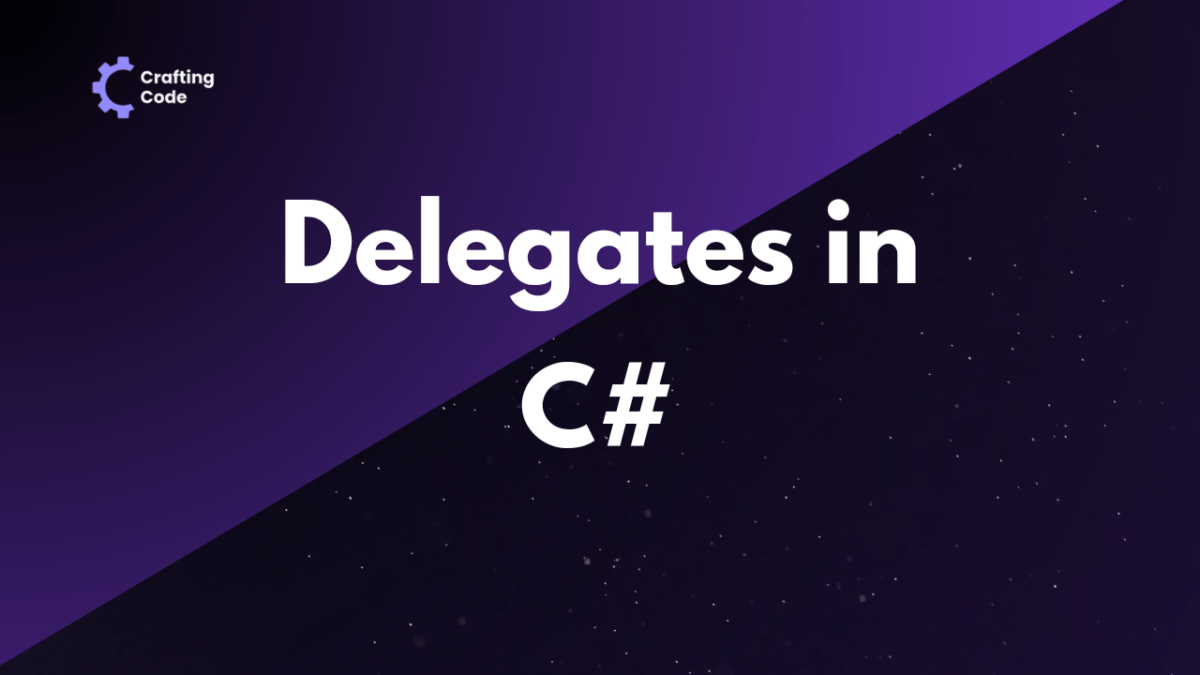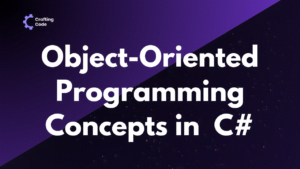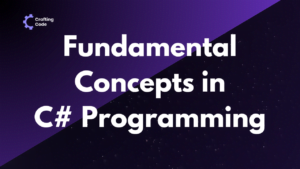Delegates in C# plays an important role in facilitating the implementation of function pointers and callback mechanisms. They provide a powerful means of achieving decoupling between components, enhancing code flexibility, and enabling advanced programming paradigms.
In this tutorial, we will get into the intricacies of delegates in C#, exploring their syntax, usage, and the advantages they bring to the table.
What are delegates in C#
A delegate is essentially a type that represents references to methods, allowing for dynamic method invocation. It acts as a powerful mechanism to create callback functions and implement event handling, providing a better foundation for various programming scenarios.
Delegates enable the passing of methods as parameters, making them an integral part of C# programming, especially in scenarios where callback functions or event handling is required.
// Declaration of a delegate named MyDelegate
delegate void MyDelegate(string message);
class Program
{
// Method that matches the delegate signature
static void DisplayMessage(string message)
{
Console.WriteLine($"Message: {message}");
}
static void Main()
{
// Instantiating the delegate with the DisplayMessage method
MyDelegate myDelegate = new MyDelegate(DisplayMessage);
// Invoking the delegate, which in turn calls the DisplayMessage method
myDelegate("Hello, Crafting-Code!");
// Output: Message: Hello, Crafting-Code!
}
}In this example:
MyDelegateis declared as a delegate type, specifying that any method it points to should take a string parameter and return void.- The
DisplayMessagemethod matches the delegate signature, so an instance ofMyDelegateis created, pointing toDisplayMessage. - Invoking the delegate calls the
DisplayMessagemethod, demonstrating the dynamic invocation of methods.
Importance of Delegates in C#
Dynamic Method Invocation:
- Delegates allow for dynamic invocation of methods, enabling flexibility in method calls at runtime.
- This dynamic nature is particularly useful in scenarios where the exact method to be executed is determined during program execution.
Callback Functions:
- Delegates serve as a foundation for implementing callback functions, enabling asynchronous and event-driven programming.
- Callbacks are essential in scenarios where a method needs to notify or trigger other methods in response to specific events.
Event Handling:
- Delegates are a fundamental component of event handling in C#, providing a mechanism for one class to subscribe to and respond to events raised by another class.
- This is crucial for building interactive and responsive applications, such as graphical user interfaces.
Decoupling Components:
- Delegates support the concept of decoupling, allowing components to interact without direct dependencies.
- This decoupling enhances code maintainability, as changes to one component don’t necessarily impact others, promoting modular and scalable code.
Passing Methods as Parameters:
- Delegates enable the passing of methods as parameters, facilitating the creation of more generic and reusable code.
- This feature is valuable in scenarios where behavior needs to be extended or modified dynamically, providing a powerful mechanism for code abstraction.
Separation of Concerns:
- Delegates contribute to a clean separation of concerns in the codebase.
- By encapsulating functionality within delegates, developers can focus on specific tasks without worrying about the intricacies of the entire program.
Maintainable Code:
- The use of delegates results in more maintainable code, as it promotes a modular design that is easier to understand, debug, and extend.
- Changes to specific functionalities can be isolated, reducing the risk of introducing bugs in other parts of the code.
Scalability and Adaptability:
- Delegates enhance code scalability by providing a mechanism for building adaptable solutions that can evolve with changing requirements.
- This adaptability is crucial for developing robust applications that can handle new features or modifications seamlessly.
Foundational for Advanced Patterns:
- Delegates are foundational for implementing advanced programming patterns such as observer patterns, strategy patterns, and others.
- This versatility empowers developers to employ sophisticated design patterns, contributing to the overall robustness of the application.
Declaring and Defining Delegates in C#
Declaration:
delegate ReturnType DelegateName(ParameterType1 param1, ParameterType2 param2, ...);ReturnType: The return type of the methods that this delegate can reference.DelegateName: The name of the delegate.ParameterType1, ParameterType2, ...: The parameter types of the methods that this delegate can reference.
Code Example:
// Declaration of a delegate named MathOperation
delegate int MathOperation(int x, int y);
// Methods that match the delegate signature
static int Add(int a, int b) => a + b;
static int Subtract(int a, int b) => a - b;
// Instantiating delegates with matching methods
MathOperation addDelegate = new MathOperation(Add);
MathOperation subtractDelegate = new MathOperation(Subtract);
// Invoking delegates
int resultAdd = addDelegate(5, 3); // Result: 8
int resultSubtract = subtractDelegate(8, 3); // Result: 5In this example:
MathOperationis declared as a delegate type, specifying that any method it points to should take two integers as parameters and return an integer.AddandSubtractmethods match the delegate signature, so instances of the delegate are created, each pointing to a specific method.- Invoking the delegates calls the respective methods, showcasing the ability to switch functionality dynamically.
Delegate Signature and Return Types
A delegate’s signature defines the structure of methods it can reference, including the number and types of parameters and the return type. It acts as a contract that methods must adhere to if they are to be assigned to that delegate.
Code Example:
delegate bool PredicateDelegate(int number);
static bool IsEven(int x) => x % 2 == 0;
static bool IsPositive(int x) => x > 0;
PredicateDelegate evenPredicate = new PredicateDelegate(IsEven);
PredicateDelegate positivePredicate = new PredicateDelegate(IsPositive);
bool resultEven = evenPredicate(6); // Result: true
bool resultPositive = positivePredicate(-5); // Result: falseIn this example:
PredicateDelegateis declared as a delegate type, specifying that any method it points to should take an integer as a parameter and return a boolean.IsEvenandIsPositivemethods match the delegate signature, so instances of the delegate are created, each pointing to a specific method.- Invoking the delegates calls the respective methods, demonstrating the concept of delegate signature and return types.
Types of Delegates in C#
Singlecast Delegates
A Singlecast Delegate in C# is a delegate that can point to a single method at any given time. It represents a one-to-one relationship between the delegate instance and the method it references. This type of delegate is straightforward, as it invokes a single method when called.
Use Cases:
- Simple Callbacks: Singlecast delegates are useful for basic callback scenarios where only one method needs to be notified or executed in response to an event.
- Event Handling: In scenarios where a specific event has a single handler, a singlecast delegate can serve as an elegant solution.
Code Example:
delegate void SinglecastDelegate(string message);
class Program
{
static void DisplayMessage(string message)
{
Console.WriteLine($"Singlecast Delegate: {message}");
}
static void Main()
{
SinglecastDelegate singlecastDelegate = new SinglecastDelegate(DisplayMessage);
// Invoking the singlecast delegate
singlecastDelegate("Hello, Singlecast!");
// Output: Singlecast Delegate: Hello, Singlecast!
}
}In this example:
SinglecastDelegateis a delegate type created to point to a single method.- An instance of the delegate is created, referencing the
DisplayMessagemethod. - When the delegate is invoked, it calls the assigned method, resulting in the specified output.
Multicast Delegates
A Multicast Delegate, on the other hand, can point to and invoke multiple methods. It supports a one-to-many relationship, allowing a single delegate instance to manage and invoke several methods simultaneously. This feature is particularly powerful in scenarios where multiple actions need to be triggered in response to an event.
Use Cases:
- Event Handling with Multiple Subscribers: Multicast delegates are beneficial when dealing with events that have multiple subscribers or handlers.
- Composite Operations: Combining multiple methods into a single delegate allows for the creation of composite operations, simplifying code organization.
Code Example:
delegate void MulticastDelegate(string message);
class Program
{
static void DisplayMessage1(string message)
{
Console.WriteLine($"Method 1: {message}");
}
static void DisplayMessage2(string message)
{
Console.WriteLine($"Method 2: {message}");
}
static void Main()
{
MulticastDelegate multicastDelegate = DisplayMessage1;
// Adding another method to the delegate
multicastDelegate += DisplayMessage2;
// Invoking the multicast delegate, which calls both methods
multicastDelegate("Hello, Multicast!");
/*
Output:
Method 1: Hello, Multicast!
Method 2: Hello, Multicast!
*/
}
}In this example:
MulticastDelegateis a delegate type capable of pointing to multiple methods.- The delegate is initially assigned to
DisplayMessage1, and then another method (DisplayMessage2) is added using the+=operator. - When the multicast delegate is invoked, both methods are called sequentially, producing the combined output.
Delegate Chaining
Delegate chaining is a powerful feature in C# that allows multiple methods to be associated with a single delegate instance. When the delegate is invoked, all the methods in the chain are executed in the specified order. This capability enhances flexibility and promotes a modular design, enabling developers to extend functionality by dynamically adding or removing methods from the chain.
Dynamic Composition of Functionality: Delegate chaining facilitates the dynamic composition of functionality. It enables developers to build modular and extensible systems where different methods can contribute to a specific operation without the need to modify existing code.
Ordering and Execution of Multiple Methods in a Delegate Chain
Ordering of Methods: The order in which methods are added to the delegate determines the sequence of their execution. Methods added first will be called first when the delegate is invoked.
Code Example:
delegate void ChainedDelegate(string message);
class Program
{
static void Method1(string message)
{
Console.WriteLine($"Method 1: {message}");
}
static void Method2(string message)
{
Console.WriteLine($"Method 2: {message}");
}
static void Main()
{
ChainedDelegate chainedDelegate = Method1;
// Adding Method2 to the delegate chain
chainedDelegate += Method2;
// Invoking the chained delegate
chainedDelegate("Hello, Delegate Chaining!");
/*
Output:
Method 1: Hello, Delegate Chaining!
Method 2: Hello, Delegate Chaining!
*/
}
}In this example:
ChainedDelegateis a delegate type used for chaining multiple methods.Method1andMethod2are added to the delegate chain.- When the delegate is invoked, both methods are called in the order they were added.
Real-World Scenarios for Delegate Chaining
1. Event Handling: Delegate chaining is commonly used in event handling scenarios. When an event occurs, multiple subscribers (methods) can be notified using a chained delegate, allowing each subscriber to respond to the event independently.
Code Example:
public class EventPublisher
{
// Define a delegate for event handling
public delegate void EventHandler(string message);
// Create an event using the delegate
public event EventHandler OnEventOccurred;
// Method to trigger the event
public void TriggerEvent(string message)
{
OnEventOccurred?.Invoke(message);
}
}
class Program
{
static void Subscriber1(string message)
{
Console.WriteLine($"Subscriber 1 received: {message}");
}
static void Subscriber2(string message)
{
Console.WriteLine($"Subscriber 2 received: {message}");
}
static void Main()
{
EventPublisher eventPublisher = new EventPublisher();
// Add subscribers to the event
eventPublisher.OnEventOccurred += Subscriber1;
eventPublisher.OnEventOccurred += Subscriber2;
// Trigger the event
eventPublisher.TriggerEvent("Real-world Event Handling");
/*
Output:
Subscriber 1 received: Real-world Event Handling
Subscriber 2 received: Real-world Event Handling
*/
}
}2. Plugin Systems: In applications with plugin architectures, delegate chaining allows dynamically loading and executing methods from external plugins. Each plugin can contribute functionality by adding its methods to a common delegate.
3. Workflow Processing: Delegate chaining is valuable in workflow processing where a series of steps or actions need to be executed in a predefined order. Each step can be represented by a method in the delegate chain.
Callbacks and Event Handling
Delegates as Callbacks
Callbacks in programming refer to the practice of passing a function (or method) as an argument to another function, allowing the called function to execute the passed function. Delegates in C# serve as a natural choice for implementing callbacks. By using delegates, methods can be treated as first-class citizens, enabling dynamic function invocation.
Use of Delegates as Callbacks:
- Asynchronous Operations: Delegates are often used for defining callback methods in asynchronous programming, where a method is called upon completion of an asynchronous operation.
- Customization of Behavior: Callbacks provide a way to customize or extend the behavior of a method without modifying its core implementation.
Code Example:
delegate void CallbackDelegate(string message);
class CallbackExample
{
static void PerformOperation(string message, CallbackDelegate callback)
{
// Perform some operation
Console.WriteLine($"Performing Operation: {message}");
// Invoke the callback
callback?.Invoke("Operation Completed");
}
static void Main()
{
CallbackDelegate callbackMethod = DisplayCallback;
// Passing the callback method to PerformOperation
PerformOperation("Data Processing", callbackMethod);
/*
Output:
Performing Operation: Data Processing
Callback Method: Operation Completed
*/
}
static void DisplayCallback(string message)
{
Console.WriteLine($"Callback Method: {message}");
}
}In this example:
CallbackDelegateis a delegate type used as a callback.PerformOperationtakes a message and a callback delegate, performs an operation, and then invokes the callback.- The
DisplayCallbackmethod serves as the callback method, providing a way to extend the behavior ofPerformOperation.
Implementing Event Handling using Delegates
Event Handling with Delegates: In C#, events are a specialized use of delegates, providing a way to notify objects when something of interest happens. Events are commonly used in user interface programming, where user actions (like button clicks) trigger responses in the program.
Code Example:
public class Button
{
// Define a delegate for click events
public delegate void ClickEventHandler(object sender, EventArgs e);
// Create an event using the delegate
public event ClickEventHandler Click;
// Method to simulate a button click
public void ClickButton()
{
Console.WriteLine("Button Clicked");
// Raise the click event
Click?.Invoke(this, EventArgs.Empty);
}
}
class Program
{
static void Main()
{
Button myButton = new Button();
// Subscribe to the click event
myButton.Click += HandleButtonClick;
// Simulate a button click
myButton.ClickButton();
/*
Output:
Button Clicked
Button Click Handled
*/
}
static void HandleButtonClick(object sender, EventArgs e)
{
Console.WriteLine("Button Click Handled");
}
}In this example:
- The
Buttonclass defines a click event using a delegate (ClickEventHandler). - The
HandleButtonClickmethod is subscribed to the click event. - When
ClickButtonis called, it raises the click event, and all subscribed methods (likeHandleButtonClick) are notified.
Benefits of Using Delegates in Event-Driven Programming
1. Loose Coupling:
- Delegates provide a level of abstraction, promoting loose coupling between event publishers and subscribers. Objects can subscribe to events without needing detailed knowledge about the event source.
2. Extensibility:
- Delegates allow for easy extensibility. New methods can be added to an event without modifying existing code, facilitating the addition of new behaviors.
3. Asynchronous Programming:
- Delegates enable asynchronous programming by providing a mechanism for handling callbacks when asynchronous operations complete.
4. Flexibility:
- Using delegates for event handling provides flexibility in terms of adding, removing, or replacing event subscribers. This is particularly beneficial in scenarios where the behavior of an application needs to be dynamically adjusted.
5. Encapsulation:
- Delegates encapsulate the notion of a callback, encapsulating the details of method invocation and allowing objects to communicate without exposing their internal implementations.
We provide insightful content and resources to empower developers on their coding journey. If you found this content helpful, be sure to explore more of our materials for in-depth insights into various Programming Concepts.
Stay tuned for future articles and tutorials that illustrate complex topics, helping you become a more proficient and confident developer.




